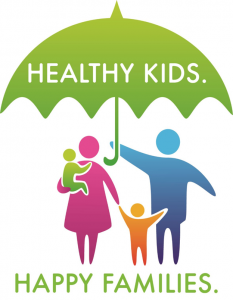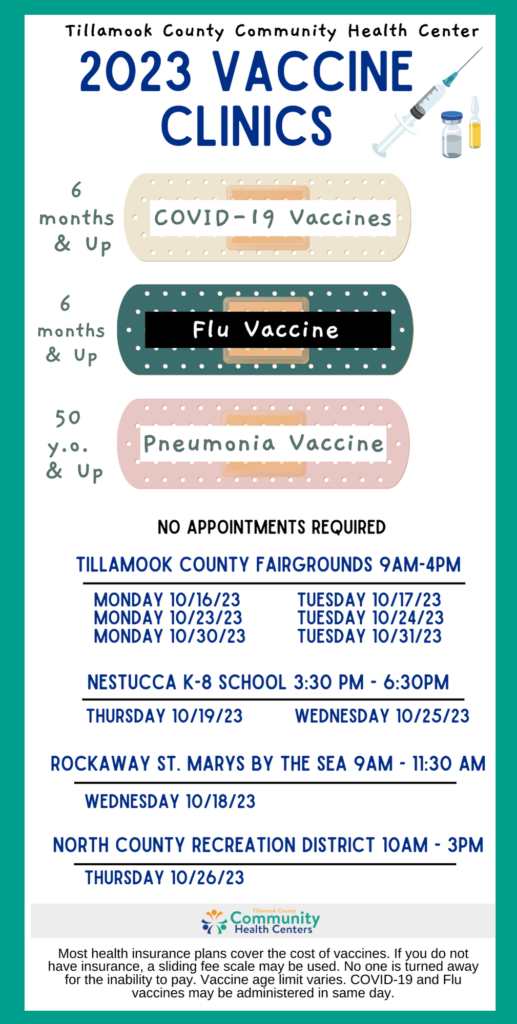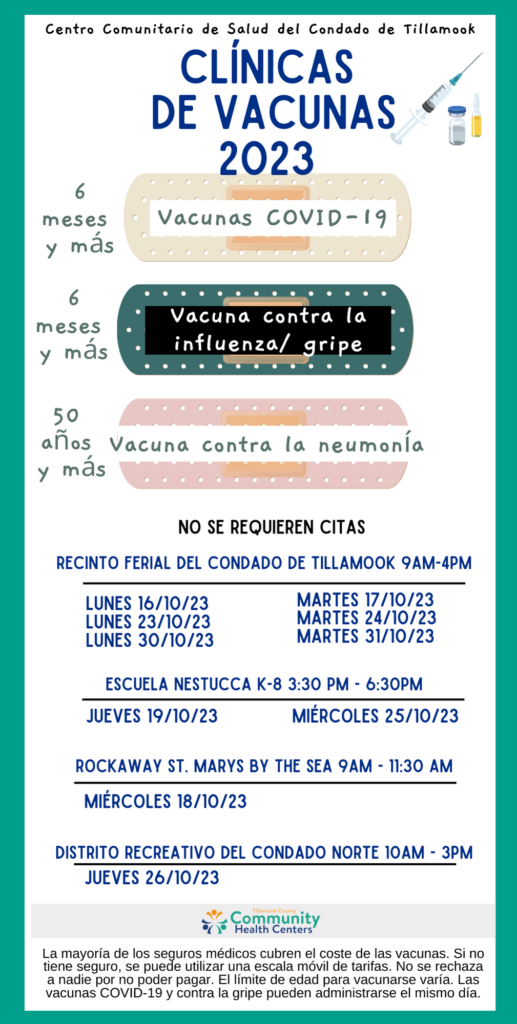Immunizations
All three of Tillamook County Health Centers provide immunizations. These protect against many diseases such as diphtheria, tetanus, whooping cough, polio, measles, and provide immunity to other conditions like COVID19. Adult immunizations are available for Hepatitis A, Hepatitis B, tetanus, influenza, pneumonia, and COVID19.
Click here for more information on immunizations for children (up to 18 years old)
Click here for more information on immunizations for adults (19 and older)
Child Immunizations
Why should children be immunized?
Immunizations help to protect against preventable disease. Most parents of young children today have never seen a case of measles, mumps, rubella, polio, diphtheria, or tetanus. If we don’t see these diseases, it can be hard to understand why it is important to protect against them.
Immunizations are given to…
- Prevent common infections such as chickenpox
- Prevent infections that could easily reemerge such as measles
- Prevent disease such as polio that are common in other parts of the world (info here)
When should children be immunized?
CDC immunization Table Click Here
Children need to get immunized when they are babies. Children need most of their shots during their first two years, starting at birth or when they’re two months old. Children who are behind on their shots need to get immunized to be protected.
Where to get immunizations?
Children can be immunized at their regular health care provider. Ask about shots at every visit. Clinics are available in North, Central, and South Tillamook County.
Call to make an appointment 503-842-3938
Immunizations for School
Shots are required by law for children who attend public schools, private schools, preschools, childcare facilities, and Head Start programs in Oregon. Nearly every place that provides care for a child outside the home requires shots or an exemption to stay enrolled (more info).
For Oregon school’s immunization requirements click here
Where to get copies of immunization records?
A copy is also located at any of the Tillamook County Health Centers.
Oregon Certificate of Immunization Status Form
Why is it important to keep copies of immunization records?
Most people are busy and have trouble remembering a shot from years back. Keeping a shot record of immunizations ensures that children will not miss any immunizations. Immunization record are an important part of permanent medical records that will be needed throughout life. It’s up to the guardians to make sure children are protected and up to date on immunizations.
Flu Program
Flu Shots
Every flu season is different, and influenza can affect people differently. Even healthy children and adults can get very sick from the flu and spread it to others. Everyone aged 6 months and older should receive an annual influenza vaccination. Getting an annual influenza vaccination will protect you and those you care about from the flu. A seasonal flu vaccination is especially recommended for people with chronic medical conditions, pregnant women, people living or caring for babies six months and younger or people who are unable to be vaccinated because of health reasons, and all health care workers.
Vaccination – the single best way to prevent the flu is to get vaccinated each fall. In the absence of vaccine, however, there are other ways to protect against flu.
Call to make a vaccination appointment 503-842-3938 at one of our locations
Central County Health Center – 801 Pacific Avenue, Tillamook, OR 97141
North County Health Center – 276 South Hwy 101, Rockaway Beach, OR 97136
Prevention – is a crucial part of staying healthy, the following steps may help prevent the spread of respiratory illnesses like flu:
- Avoid close contact with people who are sick. When you are sick, keep your distance from others to protect them from getting sick too
- Stay home from work, school, and errands when you are sick. You will help prevent others from catching your illness
- Cover your mouth and nose with a tissue when coughing or sneezing. It may prevent those around you from getting sick
- Washing your hands often will help protect you from germs
- Avoid touching your eyes, nose, or mouth. Germs are often spread when a person touches something that is contaminated with germs and then touches his or her eyes, nose, or mouth
COVID-19 Vaccines
Why get the vaccine?
- Getting vaccinated against COVID-19 can lower your risk of getting and spreading the virus that causes COVID-19. Vaccines can also help prevent serious illness and death.
- All steps have been taken to ensure that vaccines are safe and effective for people ages 5 years and older.
- If you already had COVID-19, you should still get a COVID-19 vaccine for added protection.
When you are up to date on COVID-19 vaccination, you can resume many activities with proper precautions (e.g., mask wearing in indoor public spaces).
How to get the vaccine?
COVID-19 vaccines are available by appointment at:
- TCCHC Main medical clinic 503-842-3900
- Rinehart Clinic 1-800-368-5182 Ext. 100
- Adventist Health Tillamook 503-815-2110
For updated information check out our social media (here) and COVID19 pages (here)
More information about the vaccine (click here).
More information from the Oregon Health Authority (click here).
Vaccine Safety
Are immunizations safe?
Reactions to the shots may occur, but they are rarely serious. The site may be tender to touch for a few days. Remember that the risk in not immunizing far greater than the risk of a serious reaction.
What should I know about thimerosal and autism?
Thimerosal is an organic mercury-based preservative used in vaccines. Thimerosal has been an additive to vaccines since the 1930’s because it is very effective in preventing bacterial and fungal contamination. There are no valid studies that show a link between thimerosal in vaccines and autistic spectrum disorder. Additional information here.
Vaccine Preventable Diseases
Diphtheria – is easily spread through coughing or sneezing. Symptoms of this preventable disease can lead to difficulty swallowing, suffocation, heart failure or paralysis if untreated (more info here).
Tetanus – also known as lockjaw enters though a wound and produces a poison which impacts the nervous system. Symptoms of this preventable disease lead to headache, irritability, stiffness, and muscle spasms. Three out of ten people in the U.S. who get tetanus die (more info here).
Pertussis – also known as whooping cough is highly contagious and causes severe spells of coughing which can interfere with eating, drinking and breathing. In the United States about 65% of reported cases are in children under 5 years old (more info here).
Measles – is highly contagious. One in every 1,000 children who get it will contract encephalitis which can lead to deafness and/or mental retardation. Symptoms of this preventable disease are a rash, high fever, cough, runny nose, and water eyes, lasting for up to two weeks (more info here).
Mumps – is a preventable disease that causes fever, headache, and inflammation of the salivary glands. One out of ten who get mumps develop meningitis which can cause swelling of the brain leading to permanent loss of hearing (more info here).
Rubella – is a preventable disease that is very serious in pregnant women. There is an 80% chance that mothers infected during pregnancy will have a child with defects. Symptoms of this disease are fever and rash, lasting 24 hours (more info here).
Haemophilus Influenzae Type B – Is a preventable disease that causes pneumonia, infections of the blood, joints, bones, soft tissues, throat and covering of the heart. With out immunization one out of 200 children will contract before their fifth birthday (more info here).
Polio – is a preventable disease that can cause paralysis and death. Mild symptoms include fever, sore throat, nausea, headaches, stiffness and stomach aches (more info here).
Varicella – also known at chickenpox is a preventable, highly contagious, disease which can lead to skin infection, scars, pneumonia, brain damage or death (more info here).
Cost
The Vaccines for Children program is funded by the Centers for Disease Control and Prevention and provides free vaccines to children who qualify (more info here).
The Vaccines for Children program is designed to help protect all children against vaccine-preventable diseases. Unfortunately, many children are not vaccinated because their parents either do not have health insurance or their health insurance does not cover vaccines.
Children are eligible to receive free vaccines before their 19th birthday who:
- are Medicaid-eligible;
- do not have health insurance;
- are an American Indian or Alaskan Native; or
- are underinsured.
There may be a minimal charge for administration of vaccine but no one is ever denied vaccines due to inability pay.



